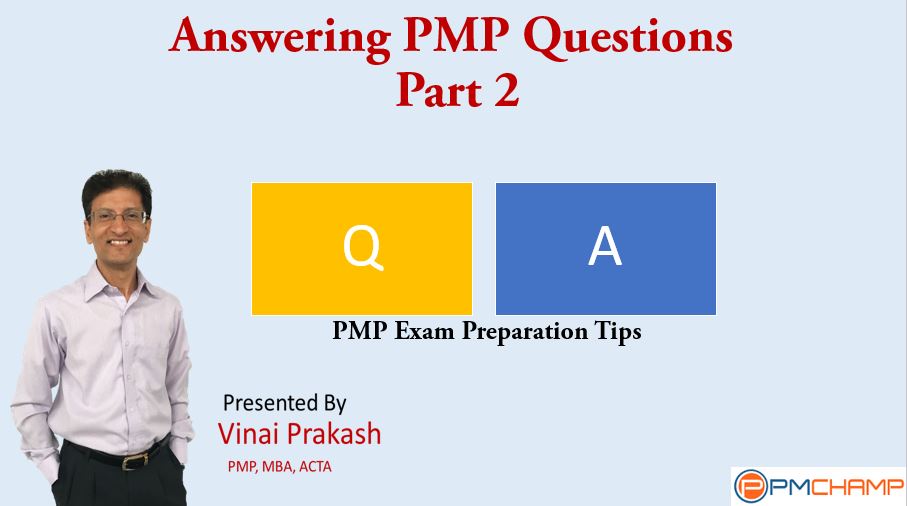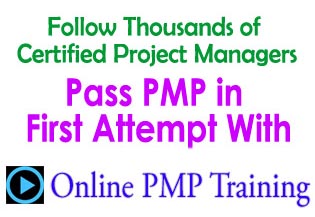In this series, I am discussing different types of PMP questions, and how to analyze the question, and review each choice, before choosing the correct answer. In the First Part, we saw how to answer PMP questions, using the information provided in Process Names.
Today, I am going to review a mock PMP question sent to me by one of our PMCHAMP Online PMP Coaching Student. Let’s look at this PMP Question first.
QUESTION: Your are the project manager of The-Magnificient-Olympic-Stadium Project. The project has a medium amount of risk and is not very well defined. The sponsor calls you for a meeting, and hands you a project charter. He then asks you to confirm that the project can be completed within the project cost budget. What is the BEST method to handle this situation?
A. Build the estimate in the form of a range of possible results.
B. Ask the team members to help estimate the cost based on the project charter.
C. Based on the information you have, calculate a parametric estimate.
D. Provide an analogous estimate based on past history.
Go ahead, and make a choice. You must take a stand. Don’t worry if it is right or wrong. Just choose A, B, C or D.
Now, as you know, you have to do 200 questions in 4 hours, which gives you barely 80 seconds per question. Therefore, you must be quick in reading, analyzing, and then choosing the Best answer.
Most people choose option B. According to them, option C, D, A don’t necessarily confirm if the project can be completed within budget. They tell me that these options can give us an idea but can’t really ‘confirm’. Therefore, Option B seems to be the only best answer.
Analysis of this Mock PMP Exam Question:
Look at the keywords and situation given. Follow the rules I have given earlier (PMP Exam Tips, Answering Techniques etc). Look for subtle clues given to you in the PMP question, and the answer choices.
Since the question say that the sponsor gives you the project charter – this indicates that you are in very early stages of the Project (Initiation).
Further, it says that the project is “not very well defined” ( which is common during the Project Charter stage), as things are not very clear in the begining of the Project.
A third implied clue is that since the project is in a very early stage of initiation, and you are just being given the Charter – therefore you can safely assume that you don’t have a team yet. One of the first things you do is to identify a team /team members once the Project Charter is given to you.
Since there isn’t a team, Option B is ruled out, as there is no one to do this analysis.
Option C – Parametric estimate can only be applied if things are clearly known and all parameters are available to be applied to the calculations/formula etc. This is hardly the case here, because things are not very well defined, so Option C is out too.
Option D is what most people do – provide a single number analogous estimate for the time and cost of the project. This is dangerous, as the project scope is not well defined. Giving a fixed number will be quite stressful in the later stages of the project, if you are unable to meet it.
The BEST Option is choice A – providing an estimate – in terms of a range. It does not say that range has to be for schedule only. It can be applied for cost too.
For example, you can say that – The project can be done in 8-10 months, with a cost of 45-50 million dollars.
Conclusion: What did we learn about answering PMP questions?
As we discussed in the first part of this PMP Questions Series, the most important thing is to identify which process group and knowledge area is the question referring to. This will give us clues about our team’s availability, and their expertise.
Secondly, use the information given in the question carefully to identify what is available to you, and what is not. At which stage (Process, Phase, Knowledge Area are you in).
If you would like to learn more, check out these resources:
You can always join the Online PMChamp Coaching workshop at any time. Classes begin on Monday.
And don’t be shy. Post a comment below.
Let me know if this was helpful.
What kind of PMP Questions are difficult for you or bugging you?
What’s the issue you are facing with the PMP exam preparations.
Perhaps I can help you in understanding the concepts, and applying them to the PMP Quesitons.
Cheers, and All the Best!
Vinai Prakash


